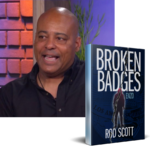
Broken Badges: Enzo
May 23, 2024
Harnessing the Power of Book Clubs for Marketing
July 30, 2024The Difference Between a Writer and an Author
It’s easy to use the words writer and author interchangeably—but are they really the same?
They are not! In fact, there are several differences between the two. The biggest distinction is that an author tends to be a full-time professional writer and often has multiple publications, whereas a writer encompasses a wider group of people. Writers might self-publish books or blog posts, and they might write professionally or scribble down musings as a hobby.
Simply put, almost all authors are writers, but not all writers are authors. So how do you know whether to classify yourself as a writer or an author? The first step is learning the differences between the two titles.
What makes a writer and author different?
There’s an ongoing debate on how to use the terms writer and author. Generally, a person who has created, published, and sold a formal literary work is an author. Many writers, on the other hand, work behind the scenes and provide freelance or ghostwriting services. However, there are more idiosyncrasies and characteristics that define these professions.
Characterizing an author
Authors are talented and dedicated writers. They tend to have more experience in the research and publishing fields than those who consider themselves writers. These wordsmiths are professional storytellers who specialize in writing in one or more genres at any length, from short stories to full-length books.
Another way authors differ from writers is that many choose to hire a literary agent to boost their career with publication assistance and book marketing tools like tours, advertisements, and an optimized Amazon listing. Since an author might make their living by creating works of literature, they often need a literary agent who can help publish and sell their books to further their success as a professional author.
Defining a writer
The connotation of the word writer is a little more casual than the title of author—but that might be a bit unfair. You can be a full-time professional writer without being a published author! Lucrative writing occupations take many forms, including ghostwriting, content creation, and editing.
You can have a successful and fulfilling career as a freelance writer—and you’ll always be in demand. Businesses, periodicals, and other professionals hire writers to create and edit content. Think of all the websites on the internet: every single blog and landing page was, at some point, written.
As a professional writer, you can help clients create blog posts, website content, social media posts, and more! You may not be considered an author, but you will be a successful writer.
Consulting the dictionary
The Oxford English Dictionary is one of the most trusted dictionaries in the world (it’s even a go-to for many authors and writers!), so it makes sense to rely on its definitions of these two terms. It identifies author not only as a noun but also as a verb. For instance, you can author a book or even a law.
As a verb, author is simply a more distinguished term for write. A writer can be anyone who writes anything, but an author is a professional writer who has published and sold their work.
Your choice: Should you be an author or a writer?
Authors write, and writers write—so which one describes you? You want to choose and use the correct title not only for accuracy but to help you find work. If you’re an author, you might already be crafting a new book. And if you’re a writer, you’ll need to market yourself to potential clients.
Considering your options as a writer
Not everyone can produce good writing. It’s a specialized skill that requires hard work, practice, experience, and a thick skin to accept feedback. Many talented people earn a comfortable living as professional writers, and there are a lot of options available to you if you’d like to pursue this career path.
One of the best ways to earn a living as a freelance writer is ghostwriting. A ghostwriter might create anything from journalistic articles to blogs to screenplays, among other things.
How does ghostwriting work? Basically, your employer comes up with an idea and outline, and you’re the wordsmith who ties it all together. As a ghostwriter, you generally won’t receive credit for the content you create, but it’s a great way to make a living!
Another popular option for professional writers is journalism. The news media and periodicals are always looking for fresh and exciting content. So try it out! Contact as many local, national, and international publications as possible to see if you can secure a consistent writing gig—or at least an occasional writing job.
Becoming an author
It’s difficult to become an author. It requires discipline, hard work, and true dedication to your craft. While a writer finishes one project and moves on to the next, an author might spend years on one book. Here are a few aspects of creating a published work as an author:
- Innovate a story
- Determine the narrator‘s voice and perspective
- Develop each character
- Give the story an interesting plot that flows well
On top of all that, your book must be interesting enough to sell to the public. The entire book writing process generally takes the author a year or more from inception to publishing and marketing. Conversely, a writer might complete multiple projects every week or month.
Classifying yourself as a professional writer
There are many different specialties in the writing world. As a professional writer, you’ll have many options for job titles you might like to pursue, such as:
- Published author
- Short story writer
- Freelance writer
- Ghostwriter
- Blogger
- Journalist
And that just names a few. Your chosen title depends on where your passion lies and what type of content you’re best at creating. Do you want to be a published author who writes inventive fiction novels? Or is creating helpful online content for your clients to post on their websites and social media more your style?
Choose your focus and let your title follow. As a writer, you might wear several different hats and hold several different titles throughout your professional career. You can do whatever you set your mind to, so pick the path you’re most comfortable with and get writing!
The vast world of writers and authors
The world of writing is immense. And that’s a good thing! This allows writers to be successful in different ways and to choose their own destinies. You can be a freelance writer or a ghostwriter and work for companies across a variety of industries, or you can make a living writing books your fans love.
There are different types of writers and authors, and each type has its own specialty. Together, they make up the wonderful world of writing.
Gaining authorship status
In general, writers achieve authorship status when they publish a book or a manuscript. The title of author is difficult to earn, so when you can officially refer to yourself as a professional, published author, wear it as a badge of pride!
Becoming both writer and author of a work
Oftentimes, the same person both writes and authors a work. Renowned storytellers have been both writing and authoring countless works of literature throughout history, including many of the classic novels and short stories you read in school. And you can do this too!
First, in order to author a book, you’ll need to create and outline the story. Determine the voice and tone and take great care in developing the characters. You might also want to bring in a developmental editor to help your idea become a hit.
Next, you can begin the writing process. Use your wordsmith abilities to craft interesting sentences, and make sure the story flows together. You want a lot of people to read and enjoy your work, so make every word in your manuscript count!
Even if you play the roles of both author and writer for your book, you’ll likely need help editing. An editor will look at your manuscript with fresh eyes to make sure it’s ready for the public to enjoy. They’ll put your work under a microscope and look for everything from plot holes to typos.
This is a good thing! You want your editor to catch any mistakes before you publish, print, and sell your book. You can’t do everything on your own, so let our experts help you.
Authoring a work without writing it
While we often think of a work’s author as being the writer as well, that’s not always the case. It’s quite common for an author to hire a professional writer to finish their work.
A professional and published author might add a writer to their team to ghostwrite an entire story. They might also ask a writer to start the editing process and look for ways to improve the language that’s already been written.
Some authors—particularly very famous people who have created and sold multiple successful works—consistently hire professional writers to actually pen the words that the public will read.
The continuing debate
Writing is an art. It continues to grow and evolve. And like all art, good writing is subject to debate. In particular the debate between what makes a person a writer versus what makes a person an author involves identifying the different opinions people have about these two titles.
Observing the opinions in the writer-versus-author debate
It’s human nature to want to express your opinions. Because of that, there are countless viewpoints and perspectives on what defines a writer versus what defines an author. This has been an ongoing debate for decades and will likely stick around for decades to come.
Many people agree on one point: all authors are writers, but not all writers are authors. Some avid readers argue that a writer is similar to a student since a student wants to learn and a writer wants to write. They also compare an author to a scholar because an academic is wholly dedicated to their studies just like an author is wholly dedicated to their books.
Identifying the writers of biographies and autobiographies
A professional author might create a nonfiction book about a historical person. This involves a great deal of research because their literary work absolutely must be factual and accurate. There’s so much time-consuming labor, in fact, that an author of a nonfiction autobiography, biography, or memoir might bring in some extra help.
Authors sometimes hire ghostwriters to craft the language and verbiage throughout their manuscripts. The authors will also need editing teams to make sure their books are ready for publishing and printing. The very best authors know that they need assistance to perfect their book before it goes public, and they welcome the help of professional writers and editors.
Looking for the commonalities between writers and authors
You love words. You love reading. And you have a special talent for creating good content. That’s why you’re pursuing a career in professional writing! However, there’s more than just a love of wordsmithing that writers and authors share.
One of the biggest commonalities between writers and authors is their ability to accept constructive criticism. Whether you’re working on children’s books, novels, or freelance content creation, your writing will be scrutinized. Your book editor and proofreader will point out mistakes, and as hard as it may be to hear, not everyone who reads your work will like it.
And that’s okay! Writers and authors need to understand that accepting and learning from constructive criticism is part of being a professional content creator.
Leverage your writing passion to become a published author
Writers and authors have fun and exciting professions. And these careers will be around forever! People and businesses will always need to hire content writers, and readers will always be thirsty for new stories.
Growing from a writer into a published author can be daunting, but we’re here to help! Elite Authors offers a number of different resources, like There’s a Book at the End of This Book, that can help you harness your talent and passion as a writer to become a published author.
Check out our publishing packages and book a complimentary meeting with an expert publishing consultant today!



